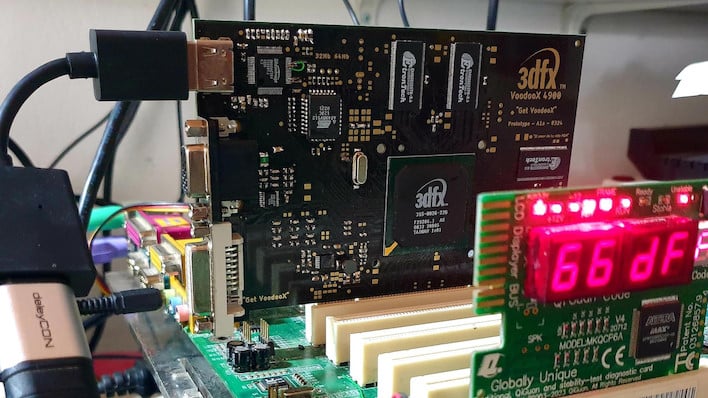If you weren’t there in the late 90s, it is very difficult to explain the particular cachet that “3dfx Voodoo” has among a certain generation of PC gaming enthusiast. 3dfx cards never had the best image quality, they rarely actually had the absolute best performance, and for the first two generations, the VGA pass-through hack that required a separate 2D graphics card was janky as heck. Looking back, it’s hard to understand why “3dfx” commands an incredible amount of nostalgic value from some folks even today—yet it absolutely does.
You see, the VSA-100 processor, which was used in the Voodoo 4 and Voodoo 5 graphics cards, was also licensed for use in certain military and aerospace applications. As a result, it was in mass production much longer than you might expect given the short market life of the Voodoo cards that utilized it. VSA stands for Voodoo Scalable Architecture, and indeed, the chips were designed so that they could work in concert with up to 15 other VSA-100 chips on a single graphics workload. Powerful systems so configured were used in simulators that were in turn used for training pilots and other personnel.
Oscar’s VoodooX concept dates back to October of 2022, but due to personal circumstances, Oscar suspended his work on the project not long after. He picked it up again early this year, and while his original prototype board used a green PCB, the new model sports a slick black PCB with VGA, DVI-D, and HDMI connectors on it. That would be cool enough, but Oscar has bigger plans than just some extra outputs.

His current model runs at 143 MHz and uses 32MB of on-board SDRAM. That’s the same memory configuration as the original Voodoo 4, although the clock rate is lower—the original V4 4500 ran at 166 MHz. Oscar says that his goal is to eventually get VoodooX running at 200 MHz stable, and to have a switch that allows for swapping between the native 32MB mode and the expanded 64MB mode. The aforementioned zxclxiv has done something similar on his Voodoo 5 “Chameleon” boards, which have 128MB of memory but feature a switch to swap back to the original 64MB configuration for compatibility purposes.
It’s not completely clear if Oscar is planning to make a dual-chip “VoodooX 5900”, or if he intends to sell the boards after he’s finalized the design, but either way, we wish him well on his project. It’s a testament to the enduring legacy of the 3dfx brand and the love its fans still hold for the Voodoo nameplate.

